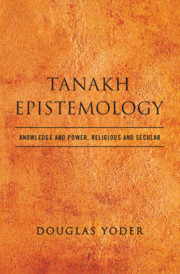Book contents
- Tanakh Epistemology
- Tanakh Epistemology
- Copyright page
- Dedication
- Contents
- Preface
- Acknowledgments
- Introduction
- 1 Reading Epistemology in the Tanakh
- 2 Unveiling Knowledge/Power
- 3 Apokalypto, Revelation, Imperium
- 4 A Revelatory Observable
- 5 Sees Hears Knows
- 6 Qoheleth’s Critique of Wisdom, Knowledge, and Critical Thought
- 7 Tanakh Epistemology in Modernity
- 8 Tanakh Epistemology and Postmodernism
- 9 Synthesis
- 10 Consequences
- Conclusion
- References
- Tanakh References
- Index
- Tanakh Epistemology
- Tanakh Epistemology
- Copyright page
- Dedication
- Contents
- Preface
- Acknowledgments
- Introduction
- 1 Reading Epistemology in the Tanakh
- 2 Unveiling Knowledge/Power
- 3 Apokalypto, Revelation, Imperium
- 4 A Revelatory Observable
- 5 Sees Hears Knows
- 6 Qoheleth’s Critique of Wisdom, Knowledge, and Critical Thought
- 7 Tanakh Epistemology in Modernity
- 8 Tanakh Epistemology and Postmodernism
- 9 Synthesis
- 10 Consequences
- Conclusion
- References
- Tanakh References
- Index
Summary
To understand Tanakh epistemology is to newly understand the West, in matters that include the meta-epistemic Sitz im Leben in modernity of philosophy and biblical criticism (Introduction) and Greeks and Hebrews (Chapter 1); Cartesian method and revelatory knowledge (Chapter 2); the concept of revelation, the genre of apocalypse, the notion of translatio imperii, and the concept of the West (Chapter 3); the relation of experimental observation to nonexperimental and visionary observation (Chapter 4); the epistemology of compassion, the critique of ideology, and the place of physical objects in epistemic pursuits (Chapter 5); the relation of classical philosophy to archaic sophia and divine theoria, and Qoheleth’s critique of wisdom, knowledge, and critical thought (Chapter 6); Spinoza, Hume, Kant, and the identity of modernity (Chapter 7); truth-based epistemology, and writing, reading, interpretation, image, madness, animals, and postmodernism (Chapter 8); and reappraisals of apokalypto, theoreo, wisdom, knowledge, power, religious, secular, Mesopotamians, Semites, Greeks, and Europeans that introduce core epistemic axioms of the Tanakh (Chapter 9). The present chapter describes some consequences.
- Type
- Chapter
- Information
- Tanakh EpistemologyKnowledge and Power, Religious and Secular, pp. 304 - 339Publisher: Cambridge University PressPrint publication year: 2020



